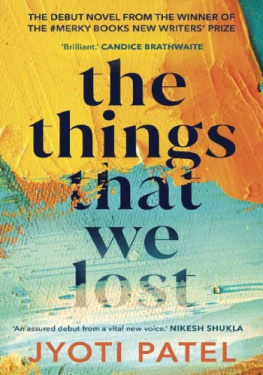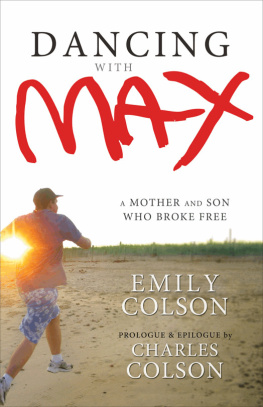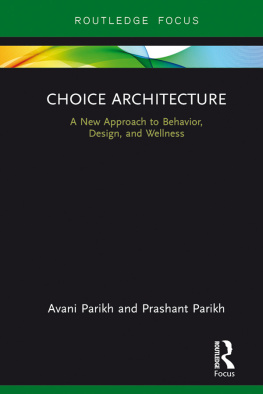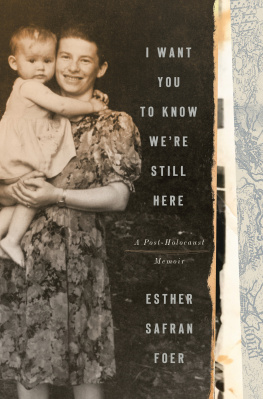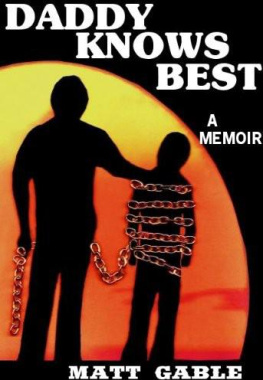About the Author
Jyoti Patel was born in Paris to British Indian parents and grew up in north-west London. She is a graduate of the University of East Anglias Prose Fiction MA and winner of the 2021 #Merky Books New Writers Prize. Her writing has previously been published as part of We Presents Literally series and in the anthology for the 2022 Bristol Short Story Prize, for which she was shortlisted. The Things That We Lost is her debut novel.
Jyoti Patel
THE THINGS THAT WE LOST
Contents
Prologue
It was a Friday morning in early October. The year was 1990. Avani sat on the periphery of her university campus, her hand moving across a page in her sketchbook. She often found herself surprised by what appeared on the paper when she let her mind wander out through the tip of a pen. On this occasion, what looked like an asymmetrical diamond was forming before her, its edges uneven. It was the shape of a country, she realised, of India.
Shed just come out of a lecture on algebraic structures, where the student sitting in front of her had turned to survey her several times, their eyes meeting without recognition. At the end of the hour, the student removed one of her shoes and socks and placed her bare foot on Avanis desk. She began to tell Avani all about her summer in Goa, and how shed loved it so much that she felt compelled to get a tattoo of India scratched into her ankle.
Avani remained seated while a flurry of students moved around her. She stared at this strangers tattoo in bemused silence, noticing how some of the ink had fallen out, how some had bled. The girls eyes had a frantic gleam to them; she smelt of patchouli, spoke too fast, and finished by asking Avani when shed moved to England from the sacred land. Avani didnt know how to respond. Ive actually never been to India didnt feel right, but it was the truth, so she said it anyway. She packed away her books and stood to leave, trying her best to shrug away her new companion, but the girl followed, talking about how shed spent a wholly transformative month in an ashram beside the Ganges River. It sounded so unfamiliar to Avani. She wanted to correct her. The River Ganga, she wanted to say. To me, its the River Ganga. And to her parents, the river was Gangaji, a goddess. Avanis rendition was a mix of the names, an attempt to blend them together. The girl had still been yammering on when Avani simply turned and walked the other way, splitting their path in two.
She pulled a blue-ink fountain pen from her coat pocket and added a vein to the sketch, hoping that she was getting the shape of the river right, these waters that flowed thousands of miles away. She felt like a fraud, being eighteen and having never visited the place that so much of her identity was attributed to. One day, she hoped, shed be able to greet India in its entirety, away from the romanticised version of it she so often met in Western art, away too from the sentimentality of the Bollywood films her mother cried into her chundri over. Avanis brother, Chand, had visited for the first time the previous summer. Hed come back with a pair of silver jhaanjhar for Avani, which shed worn every day since. For a few weeks after his return, hed been bursting with stories of near-lethal rickshaw rides in Delhi, mornings devouring idli and dosa with coconut chutney in Bangalore, the taste of juicy sitafar and papayu in Baroda. The photos hed taken were alive with the spirit of the place; women selling garlands of marigolds outside temples, giant banyan trees holding centuries of secrets within their aerial roots, green bananas stacked high on brightly coloured carts, luscious pink bougainvillea curled around doorways as though bestowing good fortune. Avanis favourite had been the photo hed taken from the window of a Tatamobile in Jaipur, capturing a man lying horizontal on a parked scooter, his feet hanging off the back of it, his arms wrapped around the handlebars as he caught a quick kip, seemingly undisturbed by rush hour zooming past him. When Avani asked her brother why the majority of the photos hed taken were of the streets, hed told her: People think the best part of India is found in the temples and the food and the valleys, but so much of India unfolds in the journey. When you travel from one state to the next. In the in between.
A light, playful voice drew Avani from these thoughts: Whatve you got there, Av?
Avani slammed her sketchbook shut and looked up to see Elliot walking across the green, clutching two orange mugs. He brushed through the lawn towards her, the hem of his jeans growing dark with dew. A blue corduroy shirt Avani had never seen before hung loose on him, the sleeves rolled up, and his chocolate curls were held back from his face by a hairband that she recognised as her own. There had been such a change to him in the three weeks since they left home for university; he was already standing taller, no longer hunched, no longer looking apologetic for just existing, no longer trying to disappear. Having a roof over his head, and not having to hop between friends sofas, park benches and hostels, had brought so much brightness back to his eyes, his cheeks, his soul. The weight of everything they left back in Harrow seemed to have unfastened itself from his shoulders. She noticed, too, that hed look at people for longer now, instead of lowering his eyes when he spoke. The rhythm of his being felt slower, calmer, as if he had finally stopped running, as if he were at peace.
Ah, come on, Av, he said, sitting on the bench beside her, a grin stretching across his face.
She leafed past a flurry of colour until she landed on the right page. Elliot handed her a mug which smelt of cardamom and ginger and home then leaned over to take a look.
India, he said.
Yes.
And thats Ganga. His finger followed the blue line. The river you were telling me about? Where the cremations happen?
Thats right.
Well go and see her one day. His murmured words were followed by a swift kiss on her temple. It had been more than six months now, but her body still responded with a quiet little thrill as his lips grazed her skin.
This is great, by the way, she told him, lifting her mug of chai. Youve definitely got the hang of it.
Learned from the best. Whens Chand meeting us?
Avani glanced at the clock tower across the green. Eleven. It was ten past. She scanned the campus, looking for a figure in her brothers trademark denim jacket and Doc Martens. Mayas coming too, she said, taking another sip. I convinced her to skive.
Excellent. Whatre we getting up to?
He wont say. Its meant to be a surprise. Hes taken the whole day off from work.
I bet its a gig, knowing Chand.
At eleven in the morning?
Fair point. He left this at my place, by the way, Elliot said, pulling a Canon F-1 from his backpack.
When was he at your digs?
Couple of days ago. She narrowed her eyes as he lifted the camera, fiddling with the dial. He came by to drop off the new Black Sabbath album.
And he didnt think to come and see me? His own sister?
Weve always known he likes me more than you, eh? Smile.
Shant. But a grin was growing against her lips.
Oh, go on, Av. The suns falling on you. You look gorgeous. Heat rose to her cheeks and he took the photo just as she succumbed to laughter.
They sat in the autumn sunshine, sipping sweet chai, watching students rushing to their morning lectures. There was something so comforting about being outside of the flurry and in something else, just the two of them, together. They chatted about the classes they had just come from, about the party theyd been to the night before, about the new friendships beginning to take shape, Elliot running a thumb over Avanis knuckles absent-mindedly as he spoke. The music department was round the corner, and the wind began to carry the sound of someone playing the piano, filling the space around their words. They fell silent then, listening for a while, until a car horn broke the spell, whipping through the air in short bursts. The sound blasted towards them once more, longer this time. A black saloon was parked by the gate marking the edge of campus. Square headlights flashed white. Whats this guys problem? Avani muttered.

